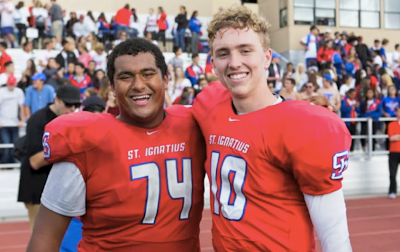It's awards season. It's that time of year when schools, sports and society recognize the great achievements, effort, abilities and advancements made by people in the past year plus. In light of this timely tradition, I would like to offer a thought on why it's important to get awards "right." And, why we might get them wrong.
On Friday, May 3, 2024 President Biden gave the nation’s highest civilian honor, the Presidential Medal of Freedom, to 19 people. Check out the impressive list here. As noted by the WhiteHouse.gov this prestigious award is "presented to individuals who have made exemplary contributions to the prosperity, values, or security of the United States, world peace, or other significant societal, public or private endeavors."All of my social media channels were flooded with posts, pictures, and praise Rev. Greg Boyle, SJ—"a Jesuit Catholic president who founded Homeboy Industries, a gang-intervention and rehabilitation program based in California,"
Beyond my colleagues and friends who work in Jesuit education, this award was celebrated by those who love his writing, Catholics, Angelinos, advocates for social justice and many more. Read about his ministry, his efforts and approach and it's impossible to question another American more deserving.
In honoring Greg Boyle, I was reminded that getting awards "right" buoys our spirits; it's strengthens our society. It is good to collectively celebrate and honor a person. It puts their life's story into our conversation and calls us to consider what they have done, what sacrifices they make, what their talents have yielded, etc. How or why the United States better because of this person? And who they recognize and celebrate?!
I appreciate that this award is extended to Americans, even after death. I was equally moved in seeing names like Medgar Evers and Jim Thorpe as 2024 honorees. What a class.
The risk, however, of extending an award is that from time to time we get it wrong. There's no other way to say it: we honor the wrong person. In some instances, there might be two candidates who are equally qualified. To award one means to leave out the other. Quite often questions of merit and desert are not easy to answer.Who decides? How do we decide? It's not easy to get it right.
To this day, there is one experience that still haunts me. I had been coaching for a good 10 years and we coaches opted NOT to honor a certain athlete with the program's highest honor. She was our best athlete and she was a great teammate. She did not however fit the mold of how athletes in the past demonstrated leadership in the capacity in which we were familiar or comfortable.
I wish we had spent more time discerning different and creative ways that our athletes demonstrate what the program’s highest honor aims to recognize. While criteria for the award helps, I also think its take a generous mind and an open one when making a decision like this one. We struggled with our choice. Please know, we made a good faith effort. We thought we were doing the right thing, but I'm not sure any of us felt totally comfortable with our choice. When it came time to extend the award, there was a collective gasp from the audience. Most people were shocked. The sentiment in that room was very different than it should or could have been. I will say, both the honoree and the athlete who did not win embraced and supported one another. Lessons learned.
 |
| The swimmer won seven Olympic gold medals and 21 world championship gold medals, more than any other woman in the sport |
I love honoring my athletes. I think awards are not to be dismissed. I want to acknowledge however, coaches, teachers, administrators and leaders don’t always get it right. It’s worth discussing how we get to bullseye. And for what it's worth, I brought this up with another coach in the program just last week. I told her how I felt and she said "no, we made the right decision." Ten years after the fact and here we are: we agree to disagree.
Whether we get it right or wrong, awards require us to hit pause—to look back, reflect and recognize. Who has made a difference? And how Why are we better because of them? And in the choosing, we might cheer or jeer. As Americans we will not all agree on who deserves the Presidential Medal of Freedom—there are a few names on this year's list that I see as moves for pure political gain. Regardless, the class stands as a collective cannon whereby we can assess what American life and culture means from the lives of its very own.
Whether your choosing the 2024 valedictorian, the NBA Clutch player or Defensive Player of the year, a Nobel Peace Prize recipient or Presidential Medal of Free honoree, let us do what we can to get awards "right" and celebrate when we do.
 |
| Of all the awards to win, I have to admit being award "Clutch Player of the Year"....might be my preference. |
Boyle
Thorpe
Ledecky







